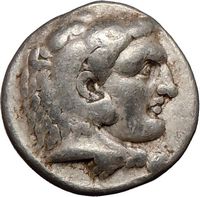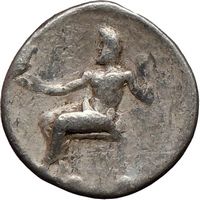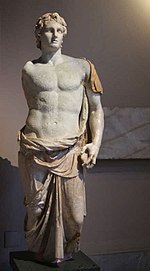Macedonian Kingdom Political Organization History Ancient Coins
Numismatic Investment
Buy authentic coins of
Macedonian Kingdom
Every coin comes with it's own custom-made, unique certificate of
authenticity $50-$100 value, absolutely free, a lifetime
guarantee of authenticity, professional research photograph and history.
You can also explore explore a selection of
thousands of certified authentic ancient Greek, Roman, Biblical,
Byzantine coins, artifacts and beyond at a trusted eBay
online coin shop.
TrustedCoins.com


Example of Authentic Ancient
Coin of:
Alexander III the Great - King of Macedonia 336-323
B.C.
Silver Tetradrachm Ake mint: 311-310 B.C.
Reference: 3292
Head of Alexander the Great as Hercules right, wearing the lion-skin
headdress.
ΒΑΣΙΛΕΩΣ AΛEΞANΔΡOY,
Zeus Aëtophoros enthroned left holding eagle and scepter; date in
field to left.
Alexander III of Macedon, popularly
known to history as Alexander the Great,
 ("Mégas
Aléxandros") was an
Ancient Greek king (basileus)
of
Macedon. Born in 356 BC, Alexander
succeeded his father
Philip II of Macedon to the throne in
336 BC, and died in
Bablyon in 323 BC at the age of 32. ("Mégas
Aléxandros") was an
Ancient Greek king (basileus)
of
Macedon. Born in 356 BC, Alexander
succeeded his father
Philip II of Macedon to the throne in
336 BC, and died in
Bablyon in 323 BC at the age of 32.
Alexander was one of the most successful military
commanders of all time and it is presumed that he was undefeated in
battle. By the time of his death, he had conquered the
Achaemenid Persian Empire, adding it to
Macedon's European territories; according to some modern writers, this
was much of the world then known to the ancient Greeks (the 'Ecumene').
His father, Philip, had unified most of the
city-states of mainland Greece under
Macedonian
hegemony in the
League of Corinth. As well as
inheriting hegemony over the Greeks, Alexander also inherited the
Greeks' long-running feud with the
Achaemenid Empire of
Persia. After reconfirming Macedonian
rule by quashing a rebellion of southern Greek city-states, Alexander
launched a short but successful campaign against Macedon's northern
neighbours. He was then able to turn his attention towards the east and
the Persians. In a
series of campaigns lasting 10 years,
Alexander's armies repeatedly defeated the Persians in battle, in the
process conquering the entirety of the Empire. He then, following his
desire to reach the 'ends of the world and the Great Outer Sea', invaded
India, but was eventually forced to turn back by the near-mutiny of his
troops.
Alexander died after twelve years of constant
military campaigning, possibly a result of
malaria,
poisoning,
typhoid fever, viral
encephalitis or the consequences of
alcoholism. His legacy and conquests lived on long after him and ushered
in centuries of Greek settlement and cultural influence over distant
areas. This period is known as the
Hellenistic period, which featured a
combination of
Greek,
Middle Eastern and
Indian culture. Alexander himself
featured prominently in the history and myth of both Greek and non-Greek
cultures. His exploits inspired a literary tradition in which he
appeared as a legendary
hero in the tradition of
Achilles.

Alexander fighting Persian king Darius III. From
Alexander Mosaic, from Pompeii, Naples, Naples National
|